Britain's heaviest man from Brierley Hill: The life and times of a local legend and 'giant'
George Lovatt – known fondly as the Brierley Hill giant – was a local legend.
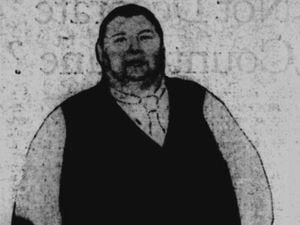
Standing tall at over seven feet and reportedly weighing in at one point at a staggering 48 stone, he was at the time of his death in 1933, Britain's heaviest man.
News reports over the years of George's life recorded him at 38 stone, 40 stone and up to 48 stone, with shoulders measuring nearly 3ft 8inches across and a neck circumference of more than 30 inches.
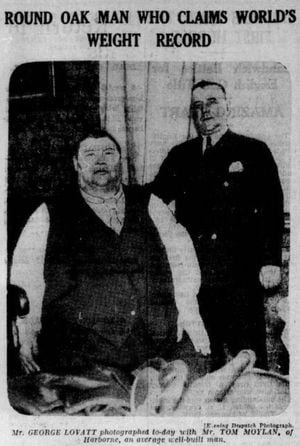
He was proud of it too. When asked why he was so large, he replied: "I must follow my mother, who was 22 stone."
And when the military came calling for the war effort, he told the authorities if they wanted him "they ought to fetch him".
George passed away at home on March 12, 1933 – at a reported 48 stone. However, the age of his death differs between articles, some saying 63 and others 64 and 65.
The story of his death made the headlines after the windows had to be removed from his house to remove him due to his "humongous size".
Keen historian and self-professed 'history influencer' Sarah Haywood, who works as a teaching assistant at Brierley Hill Primary School, has been researching Mr Lovatt's life and shared her finds from the British Newspaper Archives with Express & Star readers.
Sarah, a mum-of-two, said: "George Lovatt, who lived in Brierley Hill, Dudley Road and is said up until the time of his death in 1933, George was Britain's heaviest man. He was the heaviest man in the United Kingdom and probably the world.
"George entered a national competition and out of the 13 competitors, George won the heaviest man title, by four stone."
For the last 12 years of his life, George had "been unable to leave the house" and his oak coffin was 7ft 4in long, 3ft and 6.5in wide, and 2ft 2in deep and was declared to be "easily the largest ever made in this country". The grave was large enough to "accommodate a motorcar".
Numerous newspaper archive extracts revealed that his mother's father was also "a giant in stature", and her uncle the late Mr John Carter of Tipton was reputed to be the biggest anchor smith ever known and "helped to make an anchor for the Great Eastern, the ship which was used in laying the first cable from this country to America".
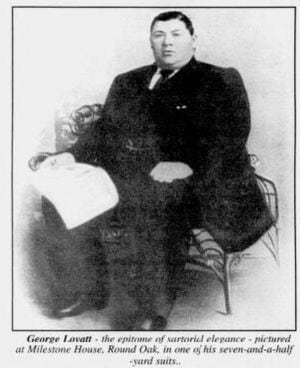
It was also said that when George visited a London Theatre to see a show – due to his large size, he could not fit into any of the seats and decided to sit in the walkway causing an obstruction. After leaving the theatre George hailed a taxi and it was said he was too heavy for the cab, which was unable to cope with the extra weight capacity – and "the bottom dropped out".
For 11 years, George worked as a chain striker at the Round Oak Iron Works, owned by the Earl of Dudley.
Sarah said: "It seems that George, who was nicknamed the Brierley Hill Giant, was an intelligent man who left school aged 12, having reached the required educational standard."
He also worked as a striker for Wright's Chainworks in Cradley Heath.
Unfortunately, he was deemed incapable of working after falling from a hayloft which resulted in a significant injury; two fractures to his leg. This accident combined with his weight had a detrimental impact on his mobility and George remained housebound for the last 12 years of his life.
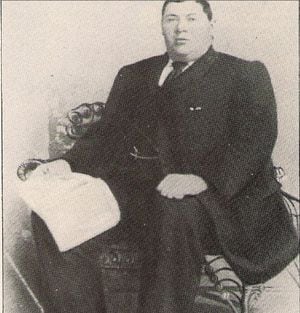
George's character captivated a community
He was known for his sense of humour and vitality. For many years George lived in Milestone House, Dudley Road. He continued his friendships with chats through his open window.
A few years before his death, George moved a few houses up to the former Unicorn Inn. A meat trolley from Marsh and Baxters was said to have been used, pushed by his brother Jack and three friends to move George to his new home.
On the odd occasion, George did visit the local public house, The Miners Arms which his sister ran. His pub visits were made by taking a ride on the back of a lorry.
On his theatre trip, a newspaper report said: "Mr Lovatt told with great glee told of a visit he paid to London when he went to a theatre. Unable to find a seat large enough he sat down in the gangway to the despair of the attendants and refused to move until a chair of suitable proportions was provided. When he left the theatre he engaged a cab. It was not constructed for such fares and on the way the bottom dropped out. Mr Lovatt was unmarried."
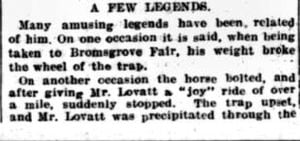
Stories of his remarkable size spread far and wide, making him a beloved figure in the region's history.





